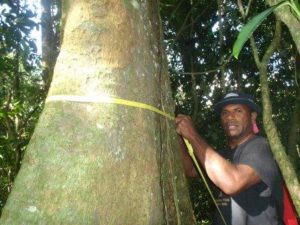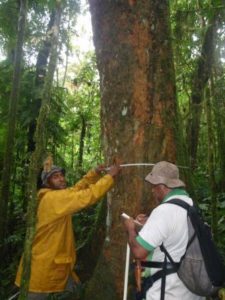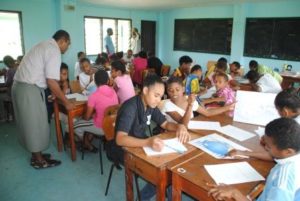SPC/GIZ Coping with Climate Change in the Pacific Islands Region (CCCPIR) programme
National policies and strategies
At the national level, SPC/GIZ CCCPIR supported the development of the National Climate Change Policy, the National REDD+ Policy, the National REDD+ Strategy, the National Climate Change Adaptation Strategy, and the review of the Forest Decree 1992.
Various components of the climate change policy have been taken by sector ministries and included in their annual corporate plans. For example, REDD+ activities are in the annual corporate plans of the Ministry of Fisheries and Forests, the Ministry of iTaukei Affairs and the Ministry of Foreign Affairs and International Cooperation.
Strengthening institutional structures
SPC/GIZ CCCPIR supported the setting up of multi-stakeholder institutional structures to support implementation of climate change adaptation and REDD+. These include the national REDD+ steering committee, the national relocation taskforce and various national climate change thematic working groups.
National websites
The programme is supporting the development of the Fiji climate change website and the Fiji National REDD+ website. The Fiji national REDD+ website was scheduled to be launched in early August 2013.
Awareness materials
To support the accurate and consistent translation of climate change terms, an iTaukei climate change glossary was developed using a multi-stakeholder consultation process. The glossary was endorsed by the Fiji cabinet in November 2012 and was recognised as the official translating tool for climate change terms for schools. Subsequent translation of all materials into the iTaukei language was carried out using the glossary. The glossary also serves as a very necessary tool for government agencies when explaining climate change-related issues in regular radio shows. It is anticipated that an updated version with additional words will be developed. The glossary is the first of its type in the Pacific.

SPC/GIZ CCCPIR is supporting the production of the national climate change newsletter released quarterly by the Ministry of Foreign Affairs and International Cooperation, and it contributed to the first national climate change summit held in 2012.
REDD+
National REDD+ activities include: (a) drafting the National REDD+ Strategy; (b) the national forest carbon stock assessment and forest cover change mapping; (c) the stakeholder study on developing reference levels for Fiji; (d) strengthening the Forestry Department’s information management system; (e) developing the Free, Prior and Informed Consent (FPIC) guidelines to be mainstreamed into government consultation processe; (f), developing REDD+ awareness materials (distributed extensively through awareness programmes conducted by other sectors); and (g) tailoring REDD+ training and awareness to forestry, agriculture and iTaukei affairs officers and pilot site landowners.
Viti Levu/ Vanua Levu
REDD+ pilot sites were established in Emalu, Viti Levu (2011), and Vunivia, Vanua Levu  (2012). The forest carbon stock assessment for Emalu forest was undertaken by trained forestry officers. An extensive biodiversity survey was conducted by local experts, and a land-use mapping exercise and soco-economic survey were conducted local government counterparts and trained youths of the village. Technical training on inventory methods, GPS handling, GIS applications, and digital mapping was conducted for survey teams. GIZ also conducted training on PRA (participatory rural appraisal) and monitoring tools and approaches for socio-economic surveys. Landowners actively participated in all surveys, and skilled individuals were identified for further training and used as resource persons for surveys of other sites. Regular feedback sessions were held with the landowners and the villagers in the vicinity. The Emalu forest was identified as the 'hottest' biodiversity forest site for Fiji, underscoring the role of REDD+ in protecting this site. A cabinet paper to alert all appropriate government actors (such as the Mineral Resources Department) on the special characteristics of this site is due to be submitted. Methodologies and experiences from the pilot site will be the basis for the development of national methodologies and guidelines, including national FPIC guidelines.
(2012). The forest carbon stock assessment for Emalu forest was undertaken by trained forestry officers. An extensive biodiversity survey was conducted by local experts, and a land-use mapping exercise and soco-economic survey were conducted local government counterparts and trained youths of the village. Technical training on inventory methods, GPS handling, GIS applications, and digital mapping was conducted for survey teams. GIZ also conducted training on PRA (participatory rural appraisal) and monitoring tools and approaches for socio-economic surveys. Landowners actively participated in all surveys, and skilled individuals were identified for further training and used as resource persons for surveys of other sites. Regular feedback sessions were held with the landowners and the villagers in the vicinity. The Emalu forest was identified as the 'hottest' biodiversity forest site for Fiji, underscoring the role of REDD+ in protecting this site. A cabinet paper to alert all appropriate government actors (such as the Mineral Resources Department) on the special characteristics of this site is due to be submitted. Methodologies and experiences from the pilot site will be the basis for the development of national methodologies and guidelines, including national FPIC guidelines.
Rotuma
In 2012, a financing agreement was signed with LaJae Rotuma (local NGO) to monitor and protect the vulnerable swampland where their taro grows. The project includes community awareness programmes and documentation of traditional knowledge relevant to climate change adaptation.
Kadavu
In 2013, SPC/GIZ CCCPIR extended its support to the relocation project of the Narikoso village community. Technical and social assessments and surveys using participatory approaches were conducted by a multi-sectoral team to provide guidance on the relocation workplan. Coastal (including mangrove) rehabilitation, soil stabilisation and reforestation work in the field began in April 2013 and is continuing. The work is carried by a range of government agencies, SPC and GIZ bringing in their own expertise (forest assessment, land-use technologies, coastal hazard mapping, geological survey, ocean current measurements, etc.). A land-use plan encompassing adaptation responses and hazard risk reduction actions will be developed. Social and cultural issues are considered in the overall planning. Experiences from Narikoso and the other relocation site of Vunidogoloa will be fed into the national relocation guidelines currently being developed.
In partnership with UNDP, SPC/GIZ CCCPIR is assisting the Fiji Department of Energy in the review of the national energy policy and strategic action plan. A National Energy Forum was convened in April 2013 which was attended by over 100 stakeholders.
Fiji’s Education Sector Strategic Plan 2012–2014 aims to provide a holistic and  empowering education system that enables all children to realise and appreciate fully their inheritance and potential, thereby contributing to peaceful and sustainable national development. In the current curriculum prescriptions, elements of climate change are addressed in basic science (forms 3 and 4), biology (forms 6 and 7), physics (forms 6 and 7) and geography (forms 6 and 7) in secondary education. In TVET, environmental changes are addressed in agricultural science (forms 3 to 7). However, in September 2011, the Fiji Ministry of Education, National Heritage, Culture and Arts identified the need to strengthen existing learning outcomes and education materials, and conduct national consultations to ensure that learning is sufficient to adequately increase students’ capacities to deal with climate change impacts and to reduce greenhouse gas emissions.
empowering education system that enables all children to realise and appreciate fully their inheritance and potential, thereby contributing to peaceful and sustainable national development. In the current curriculum prescriptions, elements of climate change are addressed in basic science (forms 3 and 4), biology (forms 6 and 7), physics (forms 6 and 7) and geography (forms 6 and 7) in secondary education. In TVET, environmental changes are addressed in agricultural science (forms 3 to 7). However, in September 2011, the Fiji Ministry of Education, National Heritage, Culture and Arts identified the need to strengthen existing learning outcomes and education materials, and conduct national consultations to ensure that learning is sufficient to adequately increase students’ capacities to deal with climate change impacts and to reduce greenhouse gas emissions.
Achievements to date:
- In 2012 the Fiji Ministry of Education endorsed a strategy to implement Objective 4 of the 2012 Fiji National Climate Change Policy covering training and education, and prior work plans aimed at integrating climate change in school curricula, tertiary courses, and vocational, non-formal education and training programmes (including special education schools).
- The Curriculum Development Unit began chairing a new national sub-working group on climate change training and education under the Climate Change Unit, Ministry of Foreign Affairs and International Cooperation.
- Through a series of workshops, curriculum development officers strengthened and integrated relevant content and learning outcomes on climate change and disaster risk management into basic and social science, geography, agriculture, industrial arts and home economics curricula. The key concepts will be introduced in classes 7 and 8.
- Based on a stocktake of existing and utilised teaching and awareness resources, the children's story book Pou and Miri learn to tackle climate change was identified as a useful teaching resource and 10,000 English and 5,000 Vosa Vaka Viti copies of it were handed over to the ministry to distribute to all Fijian primary schools (in English and Vosa Vaka Viti).
- The I-Taukei glossary of climate change terms Vosaqali ni Draki Veisau was handed over to the Ministry of Education.
- An environmental alphabet poster showing native animals and plants was developed with the Ministry of Education and NatureFiji – Mareqeti Viti – for all primary school children.
Activities in 2013:
- National consultation on the climate change and disaster risk elements in the new curriculum
- Provision of existing education and awareness materials relating to climate change and disaster risk management of various agencies on the national climate change web-portal
- Integration of new climate change and disaster risk management curriculum elements into the national teacher pre- and in-service training
- Training of lecturers and teachers on the use of the picture-based outreach resource on climate change Learning about climate change the Pacific way